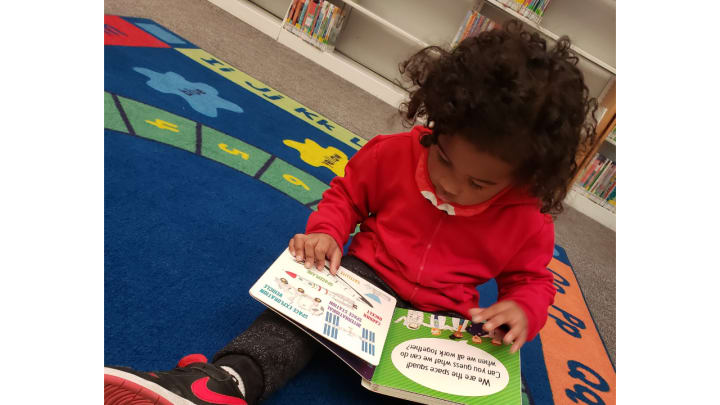
Parents and families play a vital role in helping kids become successful readers. One of the most important gifts we can give to children is to help them learn to read and write so that they can succeed in school and even beyond that. We all read for a purpose: to be entertained, to connect with others, to find out how to do something, to take a journey, and to learn about history, science, arts, and everything else you can think of. But the real question is, how can I get my child to read more often?
Reading at home for at least 15 to 20 minutes every day can help your child develop strong reading skills. I know it can be overwhelming to know where to start, but creating a reading plan can help make reading a priority at home throughout the year. Trust me, I understand after a long day, finding time for reading can be challenging and difficult. But just know support is out here.
Here are 10 tips to help support efforts to read at home:
1) Set Family Reading Goals

Set family reading goals with your kids, such as time spent reading each day or the number of books read each month. Be sure to make the goals realistic, achievable, and encourage the entire family to help each other to stay on track. Lastly, don't forget to celebrate once goals are achieved.
2) Choose the Right Books

Make sure the books that your child is reading are just right for them. Not too hard and not too easy. If the book is too hard to read for your child, they will get frustrated. If the book is too easy, your child will get bored. Talk with your child's teacher or your local librarian to find the best books for your child's reading level.
3) Talk to Them About Letters and Sounds
Sing rhyming songs, read rhyming books, say tongue twister with your kids, this helps them learn the names of the letters and the sounds that the letters make. You can even turn it into a game. For example, you could say "I'm thinking of a letter and it makes the sound buh." Then have your child guess the letter. This helps your child learn the relationships between the letters of written language and the sounds of spoken language.
4) Make Sure Books Are Around

Your child will be more likely to pick up a book and read if they are out in the open and easy to find. Keep books readily available in the car, living room, and any other other locations where your child spends time at.
5) Make Reading a Part of Your Daily Schedule

Plan consistent reading times every day of the week to make it a part of your child's daily schedule. Schedule reading time for 20 minutes after dinner or before bedtime. It is important to schedule reading time daily because it keeps your child disciplined in their reading.
6) Ask Questions

Talk about the words in the book, what are the characters doing, and what might happen next in the story to help your child understand the story they are reading. Before reading the book, have your child look at the cover and ask him/her what they think the story is about. Asking your child questions about the story will is an important reading strategy because it teaches a reader to think aloud.
7) Tell Fun Stories and Have Your Child Tell You Stories

A few benefits of story telling is that it boosts your child's listening skills, improves social skills, and may even increase their cultural understanding. It is also a great way to practice using new words. Start a family story night where everyone tells a story around a certain theme. Have fun and be creative. Don't forget to use your imagination.
8) Mix it Up and Make It Fun
Sneak books and reading into fun activities. For instance, you can do puzzles and games together that involve reading, read the weather forecast or even food recipes. Reading is everywhere.
9) Have Your Child Write

Whether your child can write a grocery list, letter, or even scribbles writing helps children connect spoken words to written words. Having your child write not only encourages reading but also brings out their imagination and creativity, helps cultivate emotional growth, and even develop critical thinking skills. It's great to always have a notepad and pen in handy, you never know when your child will have a thought, idea, or something he/she may want to write down or create.
10) Visit a Local Library

Libraries are a great resource place for events and programs like reading clubs and story time. You can also ask the librarian for help picking out great books that match your child's reading level and interests.

The life of a parent is often hectic, but we should not let that stop us from encouraging our children to read more often. It may seem overwhelming on knowing where to start, just know that reading is everywhere. Try to set a schedule for daily reading times, set achievable and realistic goals, visit the library, pick out books that interest your child, tell stories, talk about the alphabet and sounds they make, ask your child questions about the book you're reading together, have your child write, keep books around, and most importantly have fun. Don't feel discouraged if you skip a day or don't always stick to the routine you scheduled, life can get busy. But understand that we, as parents, play a vital role in helping children become successful readers.
The goal is to motivate your child to want to read so they will practice reading independently and, then he/she will become a fluent reader. We can help our child(ren) find the tools they need to succeed in life. Having access to information through books is an absolute necessity. Knowledge is power, and books are full of it. But reading is more than just a practical tool. Through books we can enrich our minds and we can also relax and enjoy some precious leisure moments.
With your help, your child(ren) can begin a lifelong relationship with books, that way they grow into adults who read easily and frequently whether it is for business, knowledge, or pleasure.
Read to your child as often as you possibly can.

Resources for Parents:
For further information on efforts to getting your child to read more often, please check out the links below.
About the Creator
Veronica
Exploring the world through words. 🌍✍️ Articles, stories, and poems on places, food, family fun, and the beauty of everyday life. Join me on a journey of discovery and imagination.






Comments
There are no comments for this story
Be the first to respond and start the conversation.